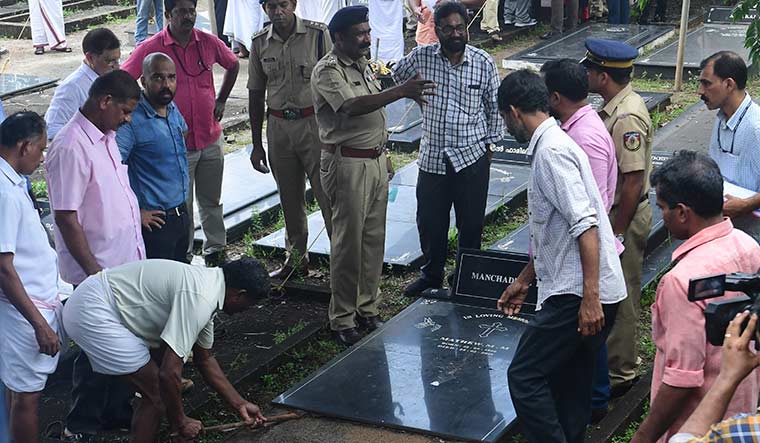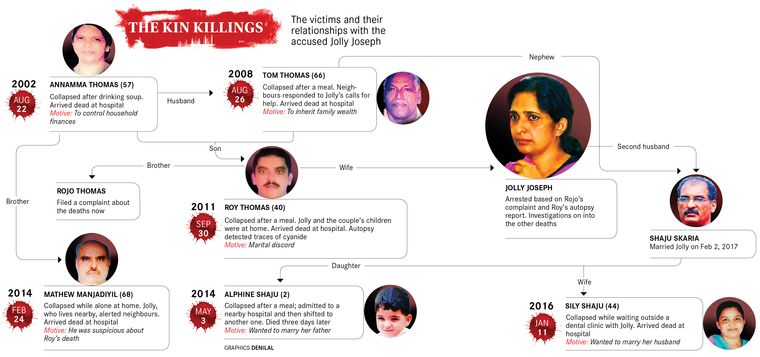By all accounts, Jolly Joseph was a jolly woman. One would rarely see her without a smile. A dutiful wife, a perfect daughter-in-law, a responsible mother and a respected academic, Jolly was the “ideal woman’’ in Koodathai, a village in the hills of Kerala’s Kozhikode district.
The facade of perfection, however, crumbled on October 5, after Jolly was arrested for the murder of her first husband, Roy. The police suspects that the 47-year-old is also behind the deaths of five more members of the family.
Jolly, a native of Idukki district, reached Koodathai as a young bride in the late 1990s. She charmed everyone who met her. Although she was a commerce graduate, she managed to convince everyone that she was a faculty member at the National Institute of Technology Calicut. Every morning, she would drive to the institute and return in the evening. She even carried a fake NIT faculty ID card.
Jolly managed to retain the image of a pious, well-behaved woman till the day the police opened her family’s burial vaults at the two local churches. “All six deaths in the family were similar in pattern and Jolly had different motives behind each murder,’’ said K.G. Simon, district police chief, Kozhikode Rural.
According to the police, her first victim was her mother-in-law, Annamma, who collapsed and died after consuming mutton soup prepared by Jolly. That was in 2002. The police believes that Jolly killed Annamma to take control of the family and its finances. “Jolly, who led a submissive life in Annamma’s presence, knew that once she is gone, the control of the family will come to her,’’ said Simon. And, she was right.
After Annamma’s death, Jolly became the de facto head of the family.
Her father-in-law, Tom Thomas, who had retired as a senior officer in the education department, was nothing more than a pawn in her hands. “The duo had an illicit relationship and Jolly had hoped that Tom would transfer the entire family property to her. But that did not happen as Tom’s other children objected. Jolly was furious and decided to eliminate Tom,’’ said an officer who is part of the investigation team.
Tom died in 2008, six years after the death of his wife. He collapsed after having food at home. It was Jolly who rushed him to the hospital, but he was dead by the time they reached the hospital. Everyone thought that Tom had died of cardiac arrest and no foul play was suspected.
Jolly’s next target was her husband, Roy, with whom she had two sons. The couple had married after a brief courtship, but their relationship turned sour soon as Roy failed in every business he took up. The situation worsened after Roy became an alcoholic.
“Jolly decided to kill Roy after he started questioning her other relationships,’’ said Simon. One night, he collapsed in the bathroom after having dinner. Jolly called the neighbours, who broke the bathroom door open and rushed him to the hospital. He was pronounced dead on arrival. That was in 2011. “While Jolly tried her best to avoid a postmortem examination, Roy’s brother insisted on having one. Doctors found traces of cyanide in his body and it was treated as a suicide,’’ said Simon. Though a case was registered, it was hushed up as Jolly argued that it would hurt the family’s reputation.
The family regrets that decision today. “Had postmortem examinations been conducted on the unnatural deaths of my parents, things would not have gotten so worse,’’ said Roy’s sister Renji. “Also, we should not have brushed Roy’s death under the carpet thinking an investigation would tarnish the family’s name.’’ She blamed Jolly for convincing the family to drop its demand for an investigation.
But not everyone was convinced by Jolly’s arguments. Annamma’s brother Mathew Manjadiyil had suspected foul play in Roy’s death. He also wanted Tom’s and Annamma’s deaths investigated. The police thinks it sealed his fate. Three years after Roy’s death, Mathew was found dead in his house. It was once again Jolly who informed the neighbours about the death. Mathew, too, allegedly had food cooked by Jolly as his last meal.
In between, Jolly had developed an interest in Shaju, son of Tom’s brother Skaria. The police said she was hooked by Shaju’s “calm and solid demeanour”. Jolly befriended his wife, Sily, and duo became very close. In 2014, Shaju and Sily’s two-year-old daughter Alphine died after having breakfast. Jolly was present when the child fell ill. “As the kid had some health issues, nobody suspected anything,’’ said the investigating officer.
Sily met a similar fate two years later. Shaju had a dental appointment that day and Jolly and Sily had accompanied him. While Shaju was with the dentist, Sily suddenly collapsed and died. Sily’s brother, too, was present at the time. Again, nobody suspected anything as the death happened in a public place. Moreover, Sily also had some serious health issues.
But people did talk when Jolly and Shaju together gave Sily the last kiss at her funeral. “When I look back, I feel Jolly stage-managed it,’’ said Shaju. He said Jolly wanted people to think that something was going on between them. They got married a year after Sily’s death. “Everyone said I should marry Jolly as we both were in a similar situation and also because our families knew each other so well,’’ said Shaju, a school teacher.
Shaju insisted that he was not aware of his wife’s alleged criminal activities. “Things were not so cordial between us. But I kept quiet as I wanted peace of mind,’’ he said.
After Roy’s death, Jolly produced a will naming her the sole beneficiary of the family’s properties. It made Roy’s siblings Renji and Rojo suspicious. Rojo, who was in the US, filed a complaint requesting an investigation into the unnatural deaths in his family. According to the police, Jolly had very close relationships with local politicians and government officials, and it might have helped her forge the will in her favour. But the investigation had clearly unnerved Jolly, forcing her to reach a settlement with Rojo. On the day the cemetery vaults were opened, she was all set to sign an agreement to split the family property among her sons and Rojo.
Jolly’s friends and neighbours find it hard to believe the allegations against her. “She was always very warm and helpful,’’ said Sulekha, a neighbour. Thomas A.K., a teacher, said Jolly was always seen as the ideal daughter-in-law. “Parents used to tell their daughters that they should be like Jolly,’’ said Thomas.
Aleyamma, who worked as a domestic help at Jolly’s house, said she never felt anything amiss there. “She always treated us well,’’ she said. But she said her mother was once hospitalised after eating from Jolly’s house.
For the police, the delays in investigation and the lack of evidence could be a major problem. “DNA extraction will be a difficult task, especially that of the older remains,” said director general of police Loknath Behera. “The lack of evidence is a huge challenge, which we will have to overcome with foolproof investigation.’’ The police have arrested M.S. Mathew, a jewellery employee who is Roy’s relative, and goldsmith Prajikumar for supplying cyanide to Jolly.
As the police go about their task, mental health specialists are trying to explain what went wrong with Jolly and the impact the case can have on the social psyche of Kerala. “She shows all traits of an anti-social personality,” said Jini K. Gopinath, a clinical psychologist based in Bengaluru. “Such people can be very charming despite their evil motives. These kind of sociopaths are very intelligent and are capable of manipulating intimate relationships without any remorse.’’
The social fallout of the case, too, is quite alarming in a state like Kerala, which has one of the highest number of family disputes in the courts. Social media is being flooded with memes and trolls which are mostly anti-women. “Just imagine a family with young children watching this news. The kind of mistrust it brews in young minds is alarming,’’ said Maya Menon, who teaches psychology at Government Women’s College, Thiruvananthapuram. “Jolly’s is an isolated case. She does not represent all women. Those who make memes and trolls must understand the impact they are causing on the collective psyche of society.’’



